Prof. Alemayehu G. Mariam
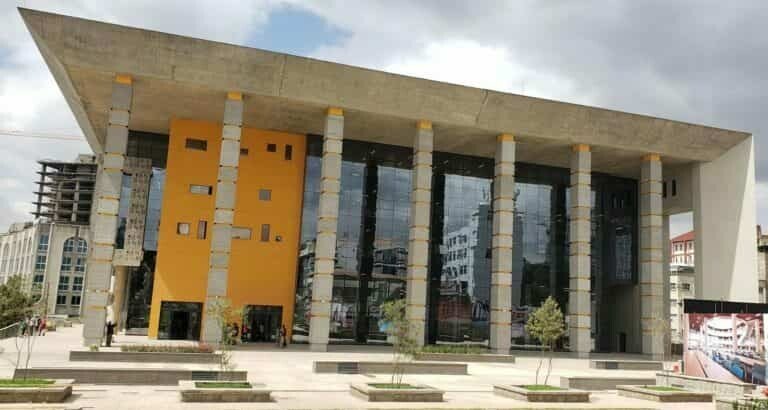 When I first came to America in 1970 (over one-half century ago!), my very first job was “library student assistant” at Augusta College (now University), in Augusta, Georgia.
When I first came to America in 1970 (over one-half century ago!), my very first job was “library student assistant” at Augusta College (now University), in Augusta, Georgia.
Augusta was the home of James Brown (“JB”), the “Godfather of Soul,” also known as “The Hardest Working Man in Showbusiness,” “Soul Brother Number One,” “Mr. Dynamite,” and “The King of Funk,” among others.
I learned two great lessons from the “Godfather of Soul.”
James Brown sang it, “I Don’t Want Nobody To Give Me Nothing (Open Up The Door, I’ll Get It Myself).
James Brown sang it again,
One more time
What do you say?
Without an education
You might as well be dead.
In other words, I learned not to expect anything to be handed to me in America.
If I want something, I have to seek out the opportunity and not wait until opportunity knocks on my door.
I also learned with sound education, I don’t have to look for an opportunity.
Opportunity will look for me.
That was the meaning of the Godfather’s message that without an education one might as well be dead.
So, my real higher education in America began in a college library.
Working as a library assistant, I opened my eyes to all types of opportunities.
Opportunities in books that beckoned, “Wanna be a physician?”
“How about an engineer?” another volume would wink quizzically.
“Gotta be a physicist and learn about the universe,” would plead another.
But I tuned to the sound of a different drummer in the stacked volumes.
“If a man does not keep pace with his companions, perhaps it is because he hears a different drummer. Let him step to the music which he hears, however measured or far away,” wrote Henry David Thoreau in “Walden”.
So, I responded to the call of the volumes asking, “How about learning about the science and art of politics? Jurisprudence or the science and philosophy of law? Or both?”
It was in the library perusing through random volumes that I decided to major in political science and go to law school after that.
Having read Aristotle’s “Politics”, I learned politics is about instilling the virtuous life in the citizenry, and that citizens must actively participate in politics if they are to be happy and virtuous.
I found Aristotle’s warning arresting. “Where absolute freedom is allowed there is nothing to restrain the evil which is inherent in every man.”
It must be the rule of law that restrains the inherent evil in man, I concluded.
That evil best described as “Homo homini lupus est”, or “Man is a wolf to another man.”
But reading the Magna Carta and the U.S. Constitution, it became clear to me politics and law are connected as hand in a glove.
I learned the English Magna Carta (Great Charter) was the first historic attempt in Western civilization to restrain the wolfish tyranny in monarchy.
No freemen shall be taken or imprisoned or disseised or exiled or in any way destroyed, nor will we go upon him nor send upon him, except by the lawful judgment of his peers or by the law of the land.” (Article 39 of the Magna Carta.)
Simply stated, the king is not above the law but subject to the rule of law; and the people’s liberties are secured against tyrannical rule by the due process of law.
Due process of law! What a mind-jarring idea for me.
I discussed the beginning of my long journey into law in my 2015 celebratory essay on the 800th anniversary of the Magna Carta “A Magna Carta for Ethiopia”, selected for inclusion on the official website of the British Magna Carta Committee operating under the Magna Carta Trust.
Spending time in the library, I imagined how the Founders of the American Republic synthesized the politics of Aristotle (along with others) with the demands of the English barons to craft the U.S. Constitution as an antidote to tyranny and establish bulwark for liberty. That Constitution has stood the test of time for 235 years.
But at the time, I did not appreciate the gravity of the fact that the Constitution was birthed in slave-holding America and that many of the Founders were slaveholders.
Nor did I have the awareness the Constitution excluded women. Coming from a patriarchal society, women’s equality was not an issue of concern or interest to me.
It was 81 years later that the Civil War amendments were ratified to make to amends for America’s original sin of slavery.
That, long story made short, was how I eventually ended up being a political science professor and constitutional lawyer.
Being a library student assistant was a dream job for me.
It was dream job because I could dream of being a professor of political science and a practicing lawyer in America and someday become a lawyer and fight for justice and due process of law.
A quixotic dream on my part.
A dream about fighting windmills and giants of injustice. Something those who have read Cervantes’ Don Quixote would certainly appreciate.
But it was an impossible dream for a kid from Africa to become a lawyer in America.
Only 5 percent of lawyers in America today are black. Only 4% of lawyers in California are black!
Forty years ago in my day, how many black lawyers were there in America?
How many immigrant African lawyers were in America?
No matter.
For me, walking the floor of the library, it was all about “dreaming the impossible dream/To fight the unbeatable foe/ To bear with unbearable sorrow/And to run where/The brave dare not go.”
So, walking through the library shelving books, I set off “To reach the unreachable star/ That one man, scorned /And covered with scars/ Still strove with his last/ Ounce of courage.”
It was not easy for me, but every day I strove to achieve my impossible dream with the last ounce of courage and confidence in the Almighty’s guidance and unfailing help.
Walking the library floor and randomly picking up and skimming books, I could see how I can transform my impossible dream into a reality.
Not by sleeping at night, but by burning the midnight oil and cracking the books.
Working as a library assistant was not a hard job at all, but most student assistants found it a humdrum and boring.
What could possibly be exciting about sticking hardcover books on wooden and metal shelves?
The job required organizing books sequentially by call numbers and walking the floor and shelving them robotically.
The job paid around $1.50 an hour, if memory serves me right.
Moonlighting mostly on weekends as a dish washer, elevator operator (pulled levers up and down transporting residents) and bell hop at a hotel for old people, I was able to generate enough income to cover my expenses.
I earned enough to pay my tuition of $400 a year, spread out over three quarter, and cover personal expenses. (Nowadays, $400 will not cover the cost of 1 credit unit. How times have changed!)
I lived off campus in the black section of town and paid $10 a month for room only. After covering bus fare, food and other living expenses, I saved a few hundred dollars in my first year to buy a used motorcycle.
But the side job did not last long.
I quit because I had more fun and enjoyment hanging around the library browsing through books even when I was not working.
“Working” in the library to me was like setting loose a kid in a toy store.
Everything I wanted was right there in the library.
What did I want most in life?
Money? Fame? Power?
Knowledge and the ability to use it to fight against injustice. That was the motive force in my life.
When I was growing up, my father gave me advice and a double mission for my life. “The wealth and money you accumulate can be lost or taken away in an instant, but no one can steal or take away your knowledge. So, go to ferenj ager (land of white people) and acquire their knowledge. Come back to Ethiopia and help your country and people.”
I succeeded in my first mission beyond my wildest expectations.
But I was a total and absolute failure in my second mission. I did not return to Ethiopia and help my people.
So, here I am now trying to catch up like the man who missed the train yesterday.
I set off to search for knowledge in America with nothing more than my father’s advice and a few hundred dollars in my pocket.
Lo and behold, I did not have to search much.
There it was. Knowledge perched on the shelf tops of the library silently winking at me to pluck it.
At the time, I did not distinguish between education and knowledge.
A few years later, I learned from Steven Biko, the South African anti-apartheid freedom fighter a jarring truth. “The most potent weapon of the oppressor is the mind of the oppressed.”
Mind as a weapon was fascinating to me. A defensive and offensive weapon, I wondered.
Much later, I learned from Nelson Mandela, “Education is the most powerful weapon which you can use to change the world.”
The educated mind changing the world. So, ideas can change the world!
I learned Paolo Freire, “Knowledge emerges only through invention and re-invention, through the restless, impatient, continuing, hopeful inquiry human beings pursue in the world, with the world, and with each other.”
So, it takes a village of curious people to create knowledge?
And so, I found education in the classroom, and knowledge in the library.
“What is knowledge to me?”
Simple answer: “Asking the right questions.”
Exactly as Albert Einstein prescribed, “If I had an hour to solve a problem and my life depended on the solution, I would spend the first 55 minutes determining the proper question to ask… for once I know the proper question, I could solve the problem in less than five minutes.”
Einstein also said, “Imagination is more important than knowledge. For knowledge is limited to all we know and understand, while imagination embraces the entire world, and all there ever will be to know and understand.”
The library in y imagination was the starship USS Enterprise in Star Trek.
Sitting in the library, I could ask the right questions and get on with my life’s mission beyond what my father had prescribed.
I could imagine and explore strange new worlds, seek out new life and new civilizations and boldly go where no man or woman has gone before.
The library was my time machine. Imagination!
I could travel from ancient Ethiopia and Africa to ancient Rome and Greece by walking over a couple of shelves.
I could even do time travel and meet the great thinkers of the Western world sitting in the library.
I had a memorable “meeting” with the chief architects of the American republic in The Federalist Papers and probed with them the genius of the U.S. Constitution birthed from the womb of slavery.
I philosophized with Shakespeare, the revolutionary. “To be or not to be, that is the question… Take arms against a sea of troubles/ And by opposing end them.”
Or as Gandhi put it actionably, “Be the change you want to see in the world.”
I reveled in Milton’s prose. “There is nothing that makes men rich and strong but that which they carry inside of them. True wealth is of the heart, not of the hand.” For that matter not of the mind either.
“He who destroys a good book kills reason itself,” warned Milton.
I became acquainted with Augustine and Aquinas but also Sartre, Camus and Fanon.
And Marx, Lenin, Dostoyevsky, Chekov, Voltaire, Russel and Wittgenstein. And the incomparable Miguel de Cervantes.
Not to leave out Hemingway, Orwell, Kafka, Faulkner, Steinbeck, Twain, Mailer, Vidal, and so many others.
I took great comfort in the writings of the great African American authors – Baldwin, Ellison, Hughes (What happens to a dream deferred?/Does it dry up like a raisin in the sun?/Or fester like a sore—And then run?), Wright and Brown.
Ironically, until much later, I remained ignorant of the literary accomplishments of women.
The thought of searching out African literature did not even occur to me.
In the library, there were more books than my eyes could see.
Those books were my friends, my companions and advisors.
As a student library assistant, I learned and quickly mastered the Dewey Decimal System and the Library of Congress Classification systems.
Understanding those classification systems enabled me to formulate a research question and quickly find the books I needed for my term papers.
Many of my professors were impressed by the quality of research and analysis in my term papers and wondered how I was able to do it.
Knowing the classification systems was my secret weapon.
As much as possible, I took a peek at many of the books I was shelving.
I came across books from astronomy to zoology.
That was probably why I became the slowest student assistant in the library.
I remember the lady supervising student assistants once telling me as she briskly walked away and probably after watching me loitering leafing through the books I was shelving, “Come on! Chop, chop on the double.”
I had no idea what she meant.
I later found out she meant, “Keep moving and shelving. You can read on your own time.”
Time for a confession and full disclosure
I have a few confessions to make.
First, I must confess I had a tiny role in the planning and design of Abrehot Library.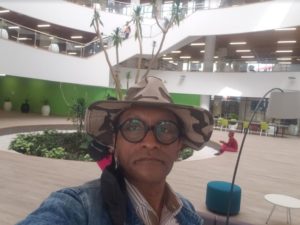
When the library project was in concept stage, I was informally asked by members of the design team what I thought about the idea of building a library in the center of Addis Ababa.
I was not only honored but ecstatic the design team sought my views.
What a blessing to have the opportunity and honor to leave a fingerprint on the construction of a state of the art library in Ethiopia!
I responded by researching the design and construction of modern libraries throughout the world and sharing ideas that could make Abrehot a state-of-the-art library.
I am humbled to see some of my ideas incorporated in the overall design of the library.
Second, I must confess that before I became a library student assistant in America, I spent a great deal of time in libraries in Addis Ababa.
I spent time at “Wemezekir,” a library established by H.I.M Haile Selassie after Ethiopia’s victory over fascist Italian occupation. The Emperor started that library by donating books from his private library.
I spent time at the Kennedy Library on weekends from time to time.
I also spent a good deal of time at the U.S. Information Service. I learned a great deal about the U.S. government, Constitution, policies, etc. from materials, books, magazines, pamphlets, photographs and other materials available at USIS.
It was at the USIS that I first learned about the American Bill of Rights, the Civil Rights Movement, the Vietnam War and the anti-war and hippie counterculture movements.
So, truth be told, when I came to America in 1970, I was not like the proverbial guy who just got off the boat confused and disoriented.
Having spent so much time at USIS, I knew a few things – probably a little more than the average American at the time- about American history, culture, literature, issues and problems.
Third, I must confess I loved and read Amharic books, especially novels. Unfortunately, after 52 years I have forgotten the names of most of the authors.
But I remember Haddis Alemayehu, Abe Gubegna, Tsegaye Gebremedhin and Kebede Michael because I still have their books in my personal library.
I also read the Ethiopian Penal and Civil Codes/Procedures (which my father used in his practice, and I still have in my collection today) from the early 1940’s to 1950s.
I enjoyed “Police Ena Irmijaw,” a weekly police blotter of sorts which reported on successful police criminal investigations and newspaper about police.
That’s probably why I chose criminal defense work.
I wrote a few articles for an English weekly magazine circa 1969. I cannot remember the name of the magazine, but I believe it had “reporter” in it.
Fourth, I had a private collection of several hundred books, likely exceeding one thousand, mostly fiction in English and periodicals.
I made most of my purchases at a bookstore called “Giannopoulos.” I was fortunate enough to have the family means to build a private collection.
I acquired many notable post-WW II American literature, especially Avant-Garde works, from this bookstore.
I bought my Amharic books, mostly used, in Merkat0.
My friends from high school will likely remember me for carrying a paperback or a magazine sticking out of my back pant pockets at all times.
I left my collection of books in a huge crate for safekeeping with family when I came to the U.S.
I was told years later that some local Derg officials conducted a search for weapons and finding none discovered a large collection of books which they concluded were subversive.
That was the end of my private collection of books!
What Abrehot Library means to me
We live in an age of distraction.
We live in an age where “knowledge” is at our fingertips.
Ironically, our eyes cannot see, and our minds cannot discern the knowledge at our fingertips.
“Knowledge” in the internet age is like the proverbial needle in the haystack. One has to throw a lot of chaff into the air to obtain a few kernels.
I have no data for Ethiopia, but there is a “steep decline in book readership in America.”
“For the first time in modern history, less than half the American adult population today reads literature.”
With social media, the dumbing down of America is taking deep root in the soil of fake news, disinformation, rumor, gossip, half-truths and non-truths.
“When America sneezes, the rest of the world catches cold,” used to be the saying.
The world today is drowning in a bottomless cyber-ocean of intellectual garbage perpetuated on social media.
For Ethiopians, Abrehot Library could be that lonely island of intellectual prosperity where they can seek refuge and enrich themselves with deep learning.
Seen in this light, Abrehot Library to me is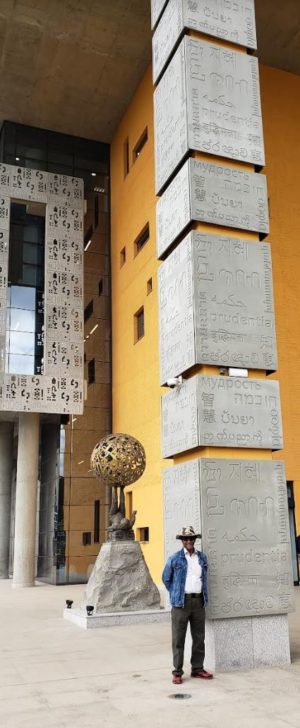
the “people’s university.” It is designed to provide information and educational opportunities free for all Ethiopians regardless of their socioeconomic status. It will serve as gateway of knowledge for Ethiopians with its enormous information and knowledge web-based resources.
an incubator for the next generation of Ethiopian scientists, philosophers, doctors, lawyers, engineers and other professionals.
a place where young people can begin their journey to achieve their impossible dream just like me and to go where no man or woman has gone before.
the fountainhead of enlightenment for those who seek to liberate themselves from ignorance. “All ye who enter Abrehot Library fear not. You have nothing to lose but your ignorance,” should be inscribed to warn patrons of their experience at Abrehot.
a resource to support serious research and development with access to digital databases.
a potential point of contact for people of diverse interests to meet and exchange ideas. Abrehot could be a catalyst for civil discourse and dialogue between individuals and groups of similar and divergent backgrounds.
a potential source of support for the Ethiopian Parliament to support the formulation of well-informed, wise and effective laws just as the Library of Congress does for the U.S. Congress.
Learning from the Library of Congress USA
America is great not because of its military industrial complex or the global currency of its currency.
America is great because of the Constitution conceived and (d)crafted by enlightenment thinkers such as James Madison, Thomas Jefferson, Alexander Hamilton, John Adams, Benjamin Franklin, Thomas Paine and others who adopted and implemented revolutionary ideas about experimental political organization which has stood the test of time.
The greatest of the enlightenment Founders, led by Jefferson, insisted on constitutional guarantees for civil liberties as the original Constitution had none.
Foremost among these liberties were freedom of speech and of the press, among others, in the First Amendment.
The First Amendment protection of speech and press guarantees expression of anything the human creative impulse can produce.
Creative impulse is the foundation of the Library of Congress, which is the research library that officially serves the United States Congress and is the de facto national library of the United States.
The Library of Congress with 41 million books and other print materials, and 130 million other items started in 1800 with a congressional appropriation of $5,000 for “such books as may be necessary for the use of Congress.”
That was followed up with the purchase of Thomas Jefferson’s 6,500 volumes.
Article I, Section 8 of the U.S. Constitution granted all legislative power to Congress.
Implicit in the power to make laws is the power to “legislate wisely or effectively in the absence of information respecting the conditions which the legislation is intended to affect or change; and where the legislative body does not itself possess the requisite information—which not infrequently is true—recourse must be had to others who possess it.
In other words, you need a vast library of knowledge readily available to lawmakers to legislate wisely and effectively.
The Congressional Research Service operating within the Library of Congress works primarily and directly for members of Congress and their committees and provides research and analysis on all matters relevant to national policymaking.
Abrehot sits directly across from the Ethiopian Parliament.
In time, we can make it the equivalent of the Library of Congress for Ethiopia.
Abrehot (Enlightenment) Library: Building up the People’s Library
As I reflect on the potentials of Abrehot Library, I remember the words of Samuel Adams, one of the American Founders. “It is in the interest of tyrants to reduce the people to ignorance and vice. For they cannot live in any country where virtue and knowledge prevail.”
How true!
When the Derg seized power, the first thing it did was arrest, jail, exile and kill the educated elements in society.
When the TPLF took power in 1991, they fired wholesale professors from the flagship university of the country.
Abrehot Library is a repository for virtue and knowledge for all Ethiopians.
Abrehot Library officially opened on January 1, 2022.
I had the privilege of visiting it on January 3, 2022 for a day.
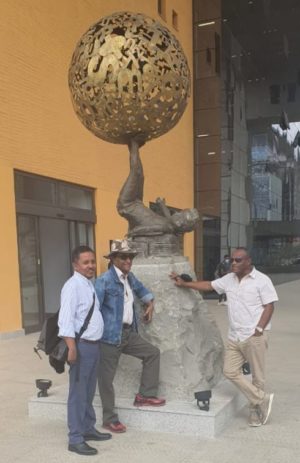
With Chief Architect Yosef Bereded (L) Samuel and Project Supervisor Dr. Fiseha Assefa (R)
The library has 4 breathtaking floors and nearly 5 acres of land.
The library is a rectangular building adorned with seven poles with words written in 18 languages. Amharic is represented by “tibeb” or wisdom.
The library has all sorts of amenities– meeting rooms, carrels for private study, a cafeteria, reading area for children and parking facilities.
The library is designed to hold nearly 1.5 million books. It provides digital access to various knowledge databases.
The library can accommodate 2 thousand patrons at any given time.
The basement has reading rooms for special books that require special attention and accessible only by special permission.
The basement also has a security control room, servers for databases, stores, food preparation and dining area.
The interior of the building has four circular floors and a small garden at the center. It has stairs and three elevators.
I was accompanied by library Chief Architect Yosef Bereded during my visit.
He told me, as he has in his public statements, the library is intended to mirror the country’s literary and cultural heritage.
People in rural Ethiopia and monasteries have a custom of reading books under the shade of trees. To express this in a modern way, the roof of the building was left open in a way that lets in light and illuminates the entire building.
Prime Minister Abiy Ahmed whose brainchild Abrehot Library is, said in his inauguration speech (video below) (author’s tr.):
We have been barred from knowledge of our history, prevented from creating wealth and blocked from achieving peace. Knowledge is the key to solving our problems. Our biggest problem is ignorance. Because of ignorance, we kill each other and squander our precious wealth. We become destructive tools of our enemies. We must solve this problem for our children… There are 18 countries out of 190 in the world that have alphabets. Only one country [Ethiopia] in Africa has an alphabet system. But we have no library…
President Sahlework Zewde said (author’s tr.):
In my own life, if I had not had the opportunity to but and read books; if I had not spent much time in the library; had I not read a book and found something new in it, I would not be the person I am today.
Donating to Abrehot Library: Call to Ethiopian diaspora
Diaspora Ethiopians should make it their patriotic duty to help Abrehot Library acquire books and other materials, including support for digital access to specialized knowledge databases.
It is best to undertake organized book drives.
In the U.S., the book drives could be organized at the state or city levels in areas where there are large concentrations of Ethiopians.
It would also help if diasporans travelling to Ethiopia could take a dozen or so books to donate to the library. It would be much appreciated.
If 200 hundred passenger on a plane carrying 300 could take a dozen or one-half dozen books, that could quickly boost the library’s collection.
Similarly, if more Ethiopians in the country could donate books from their collections, as many already have, it could significantly increase the library’s holdings.
I call on diaspora professionals to donate technical book in their respective fields. Books in science, technology, medicine, engineering, physical sciences and very much in need.
I will follow up with another commentary after conducting consultations with the library leadership.
However, there are various organizations that distribute books overseas, especially in Africa listed below. Many of them distribute books at no cost to donors except shipping costs to U.S.-based facilities.
https://www.ala.org/aboutala/offices/iro/iroactivities/intlbookdonations
https://books2africa.org/donatebooks/
https://www.africanlibraryproject.org/
https://www.booksforafrica.org/donate/donate-books.html
https://www.africanlibraryproject.org/book-drives/
Let’s all join hands, hearts and minds and make Abrehot Library the beacon of enlightenment, the lighthouse of knowledge for all of Africa!

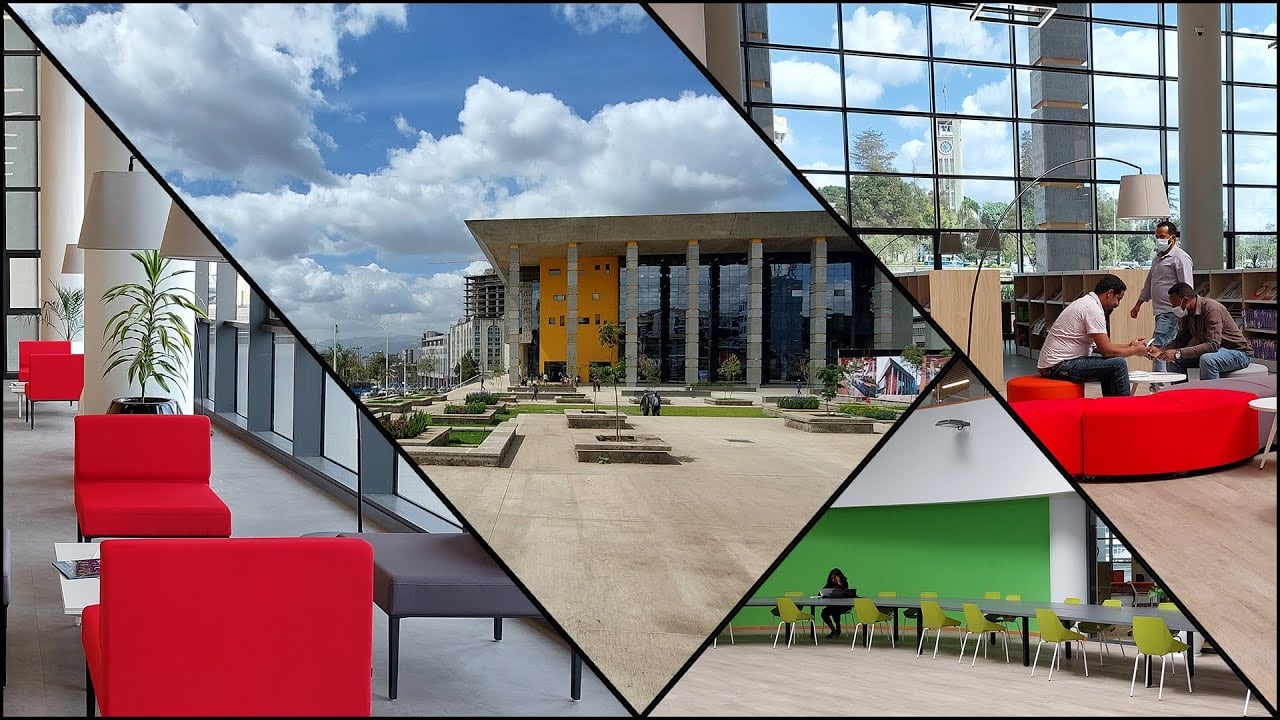
Humble Quostion
Shouldn’t the emphasis be on the CRUCIAL PROBLEM and SOLUTION thereupon facing Ethiopia TODAY?
The writer is a lawyer by profession and i was rather expecting him to say something about the absence of The Rule of Law in the country and the impending risk of civil war. I am not in anyway saying that libraries are not important, but there is something called A PRIORITY.
The youth somehow needs to be taken away from the clutches of bigots and conniving merchants of bloody mayhems. One way is to change its taste from deadly guns to the love of books. Books I mean books of innovations and the arts of being sophisticated in measuring up everything throwing at it. Libraries are good tools to achieve that. The youth should be immersed in all aspects of science, technology, engineering and math education. Such libraries should multiply and spread to towns and villages throughout the country. Development does not come out of the barrels of the gun but through technological skills and hard work. The youth must choose to go to the libraries rather than taking to the bushes. The youth should be made to walk around with enlightening books rather than walking around with deadly guns. I wholeheartedly applaud this effort.
Surprise! Surprise!
AL is writing about a library without even once mentioning his budy – the No. 1 guy in the country. Given the bad administration which is getting worse by the day, It seems AL has lost hope on the said guy and picked a neutral subject – a library. A good sign I would say. Next time he might write the TRUTH about the suffering of millions particularly Amaras.
Nobody in his right mind will oppose the country and Addis having a serious library. But Al knows that a library of this size is established by law even before its construction begins. AL, a lawyer by profession – appears to me to have retired now – should have told us about what law created it including its objectives.
That said, I would think Addis needed ten or twelve smaller libraries throuhout the city than one huge, fancy library which might not be accessible to the public. I wonder what the criteria would be to have access to the library. Even if open to the public, payment will hinders many from using it. It should be made free for all.
Finally, I can’t hide my disappontement about AL’s reference to the Library of Congress which is not comparable to ours.
And the books! Is MEDEMER a must reading for visitors? I hope not.
AL! Writing about the new library is good, but how adding your voice to the call to end the suffering of millions in the country? You can’t pretend not to have seen or heard anything.
Shegit,
You have not read the article. How did I figure out? AL quotes the no. 1 guy in his article, put the library as his ” brain child” and even pasted a Youtube video with his blabbering. I know you’ll not go back to see any of these, but you could have written a good remark if you have seen them. In any case, you’ve not missed naything. The rest of your observations are pertinent . Keep writing.
Bye.